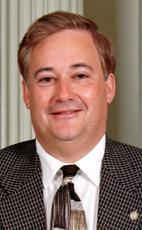Madam Speaker, it is a privilege to rise today to speak on this constitutional amendment regarding the Prince Edward Island fixed link.
I would like to stress those words; we are talking about a constitutional amendment. We seem to be slipping by that little bit of information very quickly in some of the speeches we have heard today.
I would like to begin by quoting from Hansard of May 19, 1992 when the House was embroiled in the debate on constitutional concerns. ``We believe that the referendum should be a permanent part of the process for revising the Canadian Constitution; nor can it be restricted to one or just a few provinces. The referendum ought to be national so that all Canadians in all regions of this country have the opportunity to speak on the same issue.'' These are very democratic words and I concur with them. They are from the current minister of public works.
I have no problem with the construction of a fixed link. The merits and drawbacks of this bridge have been widely discussed and debated in Prince Edward Island, across the nation and in the House of Commons. The economic benefits and the costs have all been given consideration. The environmental considerations have all been weighed. Most important, the people of Prince Edward Island gave their assent in a plebiscite held in 1988.
The problem is that we are talking about a constitutional amendment, something that affects each and every person in this country.
I would like to paint a picture. Members in this room should think of a triangle. A triangle stands on a broad base and rises to a point. This is the way I believe and my party believes we should approach these matters, with broad consultation and moving toward a point where we can get a consensus. With this motion the government is turning the triangle so it is inverted and there is no broad base of representation from the people of Canada. This is something that the Reform Party of Canada believes in very strongly, as do many millions of Canadians.
We are all aware that Madam Justice Reed decided the Canadian Constitution has to be amended in order for the fixed link to proceed. However, the reasoning behind the motion in front of us is flawed for two reasons: First, the motion is too specific. It makes specific reference to a fixed link, entrenching it in the Constitution. Second, the motion should entrench the intent of the original terms of union, that is to ensure reliable and regular travel between Prince Edward Island and the mainland, without entrenching the link specifically in the Constitu-
tion. My colleague, the member for Fraser Valley East, dealt with this issue at great length.
I find it inconsistent that this government proposes to open the Constitution and make changes only when it suits its purposes.
I would like to read another quote. On February 3 in the House the Prime Minister of Canada stated that: "No one in Canada wants to discuss the Constitution". Here we are today discussing the Constitution.
We all saw the rejection of the Charlottetown accord and what the Canadian people thought of it. This is just another case of the government's agenda versus that of the Canadian people. The government has chosen to selectively change the Constitution. Canadians do not accept this method.
I would submit that any changes to the Constitution should involve all Canadians and should be approved in a referendum. The Constitution should be concerned with the broad definition of matters rather than ways and means of accomplishing the intent, such as a fixed link.
The Constitution should deal with Canada's commitment to maintain communications and transportation with Prince Edward Island no matter what the method chosen to accomplish this.
We are running into the danger of making constitutional commitments for Canada that may not be in the best interest for all of the country. Technology may change. Currently in this day and age we must realize the rate at which things change. We are going to have to commit to this fixed link throughout time if it is entrenched in the Constitution.
These are things that we have no control of and that may change. I can give members the example of the Florida sunshine skyway and the Chesapeake Bay bridge. They have been known to close for months at a time. Are the proper plans in place for this fixed link?
If we are going to have to change the Constitution, it must be for a good and sufficient reason. We have all heard the emotions of the minister of public works. I would respond that Canadians must feel that they are a part of this constitutional amendment.
In closing, I would like to say that this motion is not just a simple motion to build a bridge. This is a motion to change the fundamental document of how our country operates, the Constitution.
This is a bridge over the troubled waters of true Canadian democracy.

